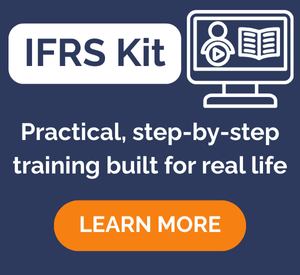How to present leases under IFRS 16 in the statement of cash flows (IAS 7)
How to incorporate leases under IFRS 16 into the statement of cash flows – solved example with video.
How to account for financial guarantees under IFRS 9?
What is a financial guarantee? What is it NOT? And, how to account for financial guarantees under IFRS 9? Learn here!
How to Account for Subsequent Expenditures in Agriculture?
How to account for veterinary costs, animal food, fertilizers, pesticides and other operating expenses in agriculture under IAS 41? Learn here!
How to prepare financial statements when going concern does NOT apply?
IFRS do not specify any rules for presenting the financial statements when the going concern basis does not apply. So, what to do? How to present the financial statements? What should we take care of? Find out here!
How to test hedge effectiveness under IFRS 9?
How to assess hedge effectiveness prospectively under IFRS 9? Do we need to calculate the hedge effectiveness retrospectively?
How to present restricted cash under IFRS?
Advances from your clients received in cash… but you can’t use that cash. That’s just one example of restricted cash. How should you present it under IFRS?
How to account for contracts to buy commodities with future delivery (own use)?
When you purchase a commodity with future delivery for fixed price, should you account for it as for derivative under IFRS 9? Or as a purchase of inventories (“own-use” contract)? Find out here with example included.
How to account for investment in gold under IFRS?
The truth is that there is no specific IFRS related to precious metals. What to do when you buy gold and other metals to store value? Learn here!
How to account for dividends paid to employees?
The accounting for the dividends paid to employees depends on whether the employee is a shareholder or not; and whether the dividend was paid out to employees in their capacity of shareholders. Learn more here.
Can we classify loans with variable interest at amortized cost?
Variable interest with cap/floor, full recourse, inflation-linked interest, collaterals – can you still classify these loans as at amortized cost?
Recent Comments
- Tan Chee Hong on Retention in construction contracts
- Ahumuza on Accounting for discounts under IFRS
- Saheed Kehinde on How to account for intercompany loans under IFRS
- hassan ali on IFRS 15 Explained: Full Guide on 5-step Model for Revenue Recognition + Free Journal Entries Template
- BiG4 on IAS 23 Borrowing Costs Explained (2025) + Free Checklist & Video
Categories
- Accounting Policies and Estimates (14)
- Consolidation and Groups (25)
- Current Assets (21)
- Financial Instruments (56)
- Financial Statements (54)
- Foreign Currency (9)
- IFRS Videos (74)
- Insurance (3)
- Most popular (6)
- Non-current Assets (56)
- Other Topics (15)
- Provisions and Other Liabilities (46)
- Revenue Recognition (27)
- Uncategorized (1)













